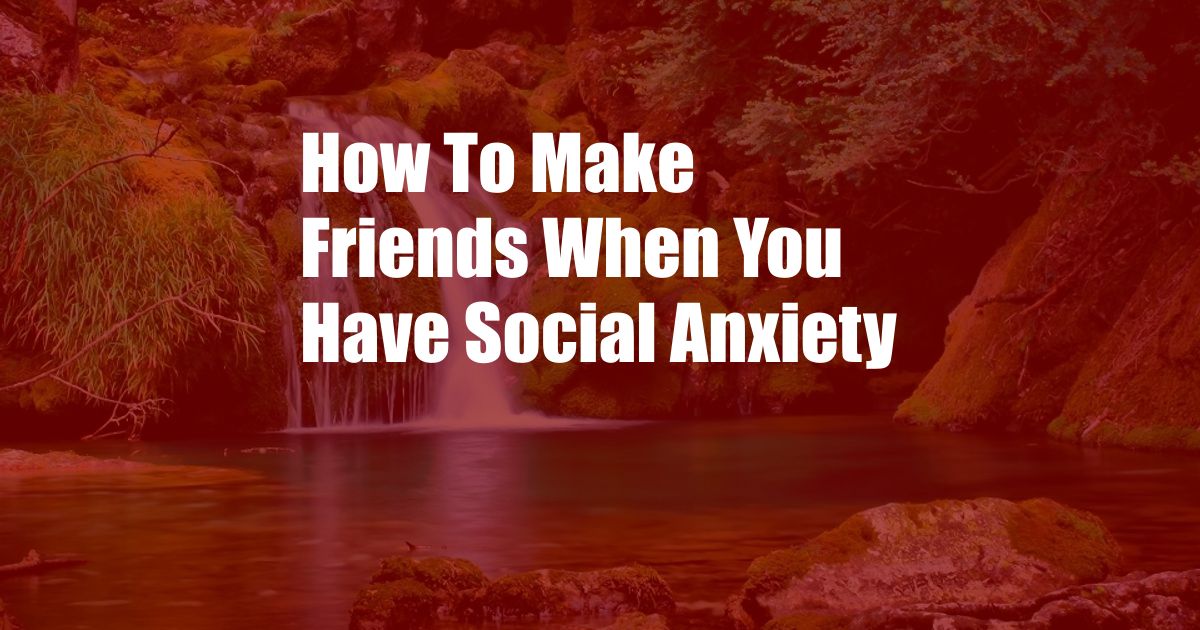
How to Make Friends When You Have Social Anxiety
We’ve all been there: you’re at a party or social event, surrounded by people you don’t know, and you feel like you just want to disappear. This feeling is called social anxiety, and it’s a common experience for many people.
If you have social anxiety, the thought of making new friends can be daunting. But it’s important to remember that you’re not alone and that there are many things you can do to overcome your anxiety and make new friends.
Not Alone in Social Anxiety
Social anxiety is a type of anxiety disorder that causes people to feel nervous, embarrassed, or self-conscious in social situations. It can make it difficult to meet new people, make friends, and feel comfortable in social settings.
Social anxiety is a very common condition, affecting about 15% of the population. It can start at any age, but it usually begins in adolescence or early adulthood.
Tips for Making Friends with Social Anxiety
There are a number of things you can do to reduce your social anxiety and make new friends. Here are a few tips:
- Start small. Don’t try to go to a big party or social event right away. Instead, start by talking to someone in a small group or at a less intimidating event like a coffee shop or library.
- Practice. The more you practice talking to people, the more comfortable you’ll become. You can practice by talking to friends, family, or even strangers.
- Set realistic goals. Don’t expect to make a hundred new friends overnight. Just focus on making one or two new friends at a time.
- Be yourself. People can tell when you’re not being yourself, so don’t try to be someone you’re not. Just relax and be yourself, and you’ll be more likely to make friends who genuinely like you.
Expert Advice for Tackling Social Anxiety when Making Friends
In addition to the tips above, there are a few things you can do to specifically address social anxiety when making friends:
- Cognitive-behavioral therapy (CBT). CBT is a type of therapy that can help you identify and change the negative thoughts and behaviors that contribute to your social anxiety.
- Exposure therapy. Exposure therapy involves gradually exposing yourself to the situations that trigger your social anxiety. This can help you to learn that these situations are not as dangerous as you think they are.
- Medication. There are a number of medications that can be used to treat social anxiety. These medications can help to reduce your symptoms and make it easier to cope with social situations.
If you’re struggling with social anxiety, don’t give up. There are many things you can do to overcome your anxiety and make new friends. Talk to your doctor, therapist, or counselor to learn more about the options available to you.
FAQ on Making Friends When You Have Social Anxiety
Q: What are the symptoms of social anxiety?
A: The symptoms of social anxiety can vary from person to person. Some common symptoms include feeling nervous, embarrassed, or self-conscious in social situations, blushing, sweating, trembling, shortness of breath, and difficulty speaking.
Q: What can I do to reduce my social anxiety?
A: There are a number of things you can do to reduce your social anxiety, such as: starting small, practicing talking to people, setting realistic goals, being yourself, and seeking professional help if needed.
Q: What are some tips for making friends when you have social anxiety?
A: Some tips for making friends when you have social anxiety include: joining a social group or club, volunteering, taking a class, and practicing your social skills.
Q: Is social anxiety curable?
A: Social anxiety is not curable, but it can be managed. With the right treatment, you can learn to manage your symptoms and live a full and happy life.
Conclusion
Making friends can be a challenge for anyone, but it can be especially difficult for people with social anxiety. However, there are many things you can do to overcome your anxiety and make new friends. If you’re struggling with social anxiety, don’t give up. Talk to your doctor, therapist, or counselor to learn more about the options available to you.
Are you interested in learning more about social anxiety?